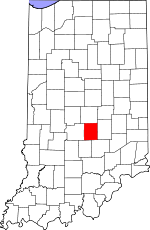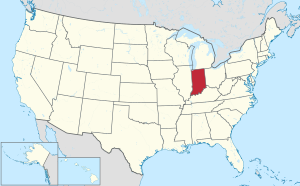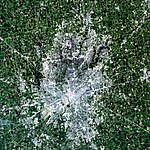Johnson County, Indiana
Johnson County | |
|---|---|
U.S. county | |
 Johnson County courthouse in Franklin, Indiana | |
 Location within the U.S. state of Indiana | |
 Indiana's location within the U.S. | |
| Coordinates: 39°29′N 86°06′W / 39.49°N 86.1°W | |
| Country | |
| State | |
| Founded | 1823 |
| Seat | Franklin |
| Largest city | Greenwood |
| Area | |
| • Total | 321.79 sq mi (833.4 km2) |
| • Land | 320.43 sq mi (829.9 km2) |
| • Water | 1.36 sq mi (3.5 km2) 0.42%% |
| Population | |
| • Estimate (2019) | 158,167 |
| • Density | 436/sq mi (168.4/km2) |
| Time zone | UTC−5 (Eastern) |
| • Summer (DST) | UTC−4 (EDT) |
| Congressional district | 9th |
| Website | www |
| Indiana county number 41 | |
Johnson County is a county located in the U.S. state of Indiana. As of 2010, the population was 139,654.[1] The county seat is Franklin.[2]
Johnson County is included in the Indianapolis-Carmel-Anderson, IN Metropolitan Statistical Area.
Transportation[]
Major highways[]
 Interstate 65
Interstate 65 U.S. Route 31
U.S. Route 31 State Road 37
State Road 37 State Road 44
State Road 44 State Road 135
State Road 135 State Road 144
State Road 144 State Road 252
State Road 252
Airport[]
- KHFY - Greenwood Municipal Airport
- 3FK - Franklin Flying Field
Geography[]
According to the 2010 census, the county has a total area of 321.79 square miles (833.4 km2), of which 320.43 square miles (829.9 km2) (or 99.58%) is land and 1.36 square miles (3.5 km2) (or 0.42%) is water.[3]
Adjacent counties[]
- Marion County (north)
- Shelby County (east)
- Bartholomew County (southeast)
- Brown County (southwest)
- Morgan County (west)
History[]
Johnson County was formed in 1823. It was named for John Johnson, a Justice of the Indiana Supreme Court.[4] This is probably John Johnson of Knox County, delegate to the State constitutional convention, appointed to the Supreme Court in 1816.
Cities and towns[]
- Bargersville
- Edinburgh
- Franklin
- Greenwood
- New Whiteland
- Princes Lakes
- Trafalgar
- Whiteland
Extinct[]
- Farwest
Townships[]
The south end of the county is also home to the Camp Atterbury military installation.
Climate and weather[]
| Franklin, Indiana | ||||||||||||||||||||||||||||||||||||||||||||||||||||||||||||
|---|---|---|---|---|---|---|---|---|---|---|---|---|---|---|---|---|---|---|---|---|---|---|---|---|---|---|---|---|---|---|---|---|---|---|---|---|---|---|---|---|---|---|---|---|---|---|---|---|---|---|---|---|---|---|---|---|---|---|---|---|
| Climate chart (explanation) | ||||||||||||||||||||||||||||||||||||||||||||||||||||||||||||
| ||||||||||||||||||||||||||||||||||||||||||||||||||||||||||||
| ||||||||||||||||||||||||||||||||||||||||||||||||||||||||||||
In recent years, average temperatures in Franklin have ranged from a low of 18 °F (−8 °C) in January to a high of 84 °F (29 °C) in July, although a record low of −22 °F (−30 °C) was recorded in January 1985 and a record high of 104 °F (40 °C) was recorded in June 1988. Average monthly precipitation ranged from 2.05 inches (52 mm) in January to 4.78 inches (121 mm) in July.[5] The coldest temperature ever recorded in Indiana was in the town of New Whiteland, Indiana, on January 19, 1994, when the temperature reached −36 °F (−38 °C).[6]
Government[]
The county government is a constitutional body, and is granted specific powers by the Constitution of Indiana, and by the Indiana Code.
County Council: The county council is the legislative branch of the county government and controls all the spending and revenue collection in the county. Representatives are elected from county districts. The council members serve four-year terms. They are responsible for setting salaries, the annual budget, and special spending. The council also has limited authority to impose local taxes, in the form of an income and property tax that is subject to state level approval, excise taxes, and service taxes.[7][8]
Board of Commissioners: The executive body of the county is made of a board of commissioners. The commissioners are elected county-wide, in staggered terms, and each serves a four-year term. One of the commissioners, typically the most senior, serves as president. The commissioners are charged with executing the acts legislated by the council, collecting revenue, and managing the day-to-day functions of the county government.[7][8]
Courts: The county maintains a Circuit Court can handle all types of cases, unless a particular case type is specifically reserved to another court.[9] The county also maintains three Superior Courts that also handle all types of cases, and also handle the small claims and juvenile cases. The judges on each of the courts is elected to a term of four years and must be a member of the Indiana Bar Association.[8]
County Officials: The county has several other elected offices that are mandated by the Indiana Constitution. These include sheriff, coroner, assessor, auditor, recorder, surveyor, and circuit court clerk Each of these elected officers serves terms of four years and oversee different parts of the county government. Members elected to county government positions are required to declare party affiliations and to be residents of the county.[8]
Johnson County is part of Indiana's Indiana's 9th congressional district; Indiana Senate districts 36, 37, and 41;[10] and Indiana House of Representatives districts 47, 58, 65, and 93.[11]
Demographics[]
| Historical population | |||
|---|---|---|---|
| Census | Pop. | %± | |
| 1830 | 4,019 | — | |
| 1840 | 9,352 | 132.7% | |
| 1850 | 12,101 | 29.4% | |
| 1860 | 14,854 | 22.8% | |
| 1870 | 18,366 | 23.6% | |
| 1880 | 19,537 | 6.4% | |
| 1890 | 19,561 | 0.1% | |
| 1900 | 20,223 | 3.4% | |
| 1910 | 20,394 | 0.8% | |
| 1920 | 20,739 | 1.7% | |
| 1930 | 21,706 | 4.7% | |
| 1940 | 22,493 | 3.6% | |
| 1950 | 26,183 | 16.4% | |
| 1960 | 43,704 | 66.9% | |
| 1970 | 61,138 | 39.9% | |
| 1980 | 77,240 | 26.3% | |
| 1990 | 88,109 | 14.1% | |
| 2000 | 115,209 | 30.8% | |
| 2010 | 139,654 | 21.2% | |
| 2019 (est.) | 158,167 | [13] | 13.3% |
| U.S. Decennial Census[14] 1790-1960[15] 1900-1990[16] 1990-2000[17] 2010-2019[1] | |||
As of the 2010 United States Census, there were 139,654 people, 52,242 households, and 37,711 families residing in the county.[18] The population density was 435.8 inhabitants per square mile (168.3/km2). There were 56,649 housing units at an average density of 176.8 per square mile (68.3/km2).[3] The racial makeup of the county was 93.9% white, 2.0% Asian, 1.1% black or African American, 0.2% American Indian, 1.2% from other races, and 1.5% from two or more races. Those of Hispanic or Latino origin made up 3.1% of the population.[18] In terms of ancestry, 28.1% were German, 15.7% were Irish, 11.5% were English, and 10.3% were American.[19]
Of the 52,242 households, 37.1% had children under the age of 18 living with them, 57.3% were married couples living together, 10.2% had a female householder with no husband present, 27.8% were non-families, and 22.6% of all households were made up of individuals. The average household size was 2.63 and the average family size was 3.09. The median age was 36.8 years.[18]
The median income for a household in the county was $47,697 and the median income for a family was $72,723. Males had a median income of $52,107 versus $36,029 for females. The per capita income for the county was $28,224. About 5.9% of families and 8.1% of the population were below the poverty line, including 11.1% of those under age 18 and 4.8% of those age 65 or over.[20]
See also[]
- Daily Journal - local daily newspaper
- National Register of Historic Places listings in Johnson County, Indiana
References[]
- ^ Jump up to: a b "Johnson County QuickFacts". United States Census Bureau. Archived from the original on 2011-06-07. Retrieved 2011-09-25.
- ^ "Find a County". National Association of Counties. Archived from the original on 2015-05-09. Retrieved 2011-06-07.
- ^ Jump up to: a b "Population, Housing Units, Area, and Density: 2010 - County". United States Census Bureau. Archived from the original on 2020-02-12. Retrieved 2015-07-10.
- ^ Gannett, Henry (1905). The Origin of Certain Place Names in the United States. Govt. Print. Off. pp. 169.
- ^ Jump up to: a b "Monthly Averages for Franklin, Indiana". The Weather Channel. Retrieved 2011-01-27.
- ^ http://www.ncdc.noaa.gov/extremes/scec/records
- ^ Jump up to: a b Indiana Code. "Title 36, Article 2, Section 3". IN.gov. Retrieved 2008-09-16.
- ^ Jump up to: a b c d Indiana Code. "Title 2, Article 10, Section 2" (PDF). IN.gov. Retrieved 2008-09-16.
- ^ http://www.in.gov/judiciary/2674.htm
- ^ "Indiana Senate Districts" (PDF). State of Indiana. Retrieved April 30, 2018.
- ^ "Indiana House Districts" (PDF). State of Indiana. Retrieved April 30, 2018.
- ^ Leip, David. "Dave Leip's Atlas of U.S. Presidential Elections". uselectionatlas.org. Retrieved 2018-05-17.
- ^ "Population and Housing Unit Estimates". Retrieved May 21, 2020.
- ^ "U.S. Decennial Census". United States Census Bureau. Retrieved July 10, 2014.
- ^ "Historical Census Browser". University of Virginia Library. Retrieved July 10, 2014.
- ^ "Population of Counties by Decennial Census: 1900 to 1990". United States Census Bureau. Retrieved July 10, 2014.
- ^ "Census 2000 PHC-T-4. Ranking Tables for Counties: 1990 and 2000" (PDF). United States Census Bureau. Retrieved July 10, 2014.
- ^ Jump up to: a b c "DP-1 Profile of General Population and Housing Characteristics: 2010 Demographic Profile Data". United States Census Bureau. Archived from the original on 2020-02-13. Retrieved 2015-07-10.
- ^ "DP02 SELECTED SOCIAL CHARACTERISTICS IN THE UNITED STATES – 2006-2010 American Community Survey 5-Year Estimates". United States Census Bureau. Archived from the original on 2020-02-14. Retrieved 2015-07-10.
- ^ "DP03 SELECTED ECONOMIC CHARACTERISTICS – 2006-2010 American Community Survey 5-Year Estimates". United States Census Bureau. Archived from the original on 2020-02-14. Retrieved 2015-07-10.
External links[]
| Wikimedia Commons has media related to Johnson County, Indiana. |
- Indiana counties
- Johnson County, Indiana
- 1823 establishments in Indiana
- Populated places established in 1823
- Indianapolis metropolitan area


